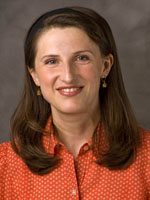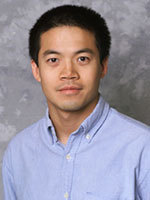Nita-Rotaru and Xu Receive CAREER Awards
02-09-2006


Professors Cristina Nita-Rotaru and Dongyan Xu received National Science Foundation CAREER awards. The CAREER program is a Foundation-wide activity that offers the foundation's most prestigious awards for junior faculty members. The CAREER program recognizes and supports the early career-development activities of those teacher-scholars who are most likely to become the academic leaders of the 21st century.
Professor Nita-Rotaru received her CAREER award for her "Scalable, Robust and Secure Group Oriented Services for Wireless Mesh Networks" research project. Her research will advance state-of-the-art group-oriented services in the context of wireless mesh networks by developing new formulations of distributed problems capturing the particularities of wireless mesh networks and the interactions between security, availability and scalability. It also studies the viability and limitations of cross-layer design as a new paradigm of building secure network services.
Professor Nita-Rotaru joined Purdue in 2003 and established the Dependable and Secure Distributed Systems Laboratory (DS^2). She holds a PhD in Computer Science from Johns Hopkins University and a MS from Politehnica University of Bucharest, Romania.
Her research interests lie in designing distributed systems and network protocols and applications that are dependable and secure, while maintaining acceptable levels of performance. Current research focuses on : designing intrusion-tolerant architectures for distributed services that scale to wide-area networks; and investigating survivable routing in wireless ad hoc networks. Her work is funded by the Center for Education and Research in Information Security and Assurance (CERIAS), by the Defense Advanced Research Projects Agency (DARPA), and by the National Science Foundation (NSF).
Professor Xu received his CAREER Award for his project entitled "Towards Virtual Distributed Environments in a Shared Distributed Infrastructure". This research will investigate virtualization technologies for better resource sharing in a shared distributed infrastructure, with respect to mutual-isolation, adaptivity, and accountability. Results of this research will promote the use of the emerging cyberinfrastructure by accommodating a wide range of science and engineering activities including education/research portals and services, virtual scientific collaboratories, and cyber-defense testing grounds.
Professor Xu joined the department in 2001. He received his PhD in Computer Science from the University of Illinois at Urbana-Champaign and his BS from Zhongshan University, China. He leads the Lab for Research in Emerging Network and Distributed Services (FRIENDS) at Purdue University.
His research is on the security, management, and provisioning of next-generation distributed systems, with a current focus on virtualization technologies for virtual distributed computing and for malware (e.g., worms and spyware) defense. He also conducts research on peer-to-peer media distribution, mobile ad hoc computing, and distributed multimedia collaboration. He is affiliated with the Center for Education and Research in Information Assurance and Security (CERIAS). His research has been supported by the National Science Foundation (NSF), Microsoft Research, and Purdue Research Foundation.
Congratulations to Professor Nita-Rotaru and Professor Xu for their achievements!
To read the Purdue University News article visit Three Purdue researchers win NSF early-career awards.